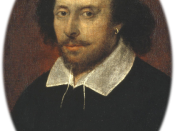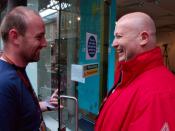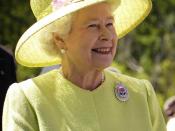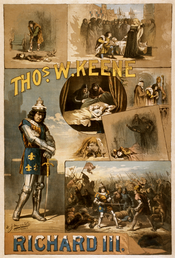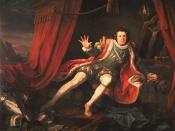Richard III- Sources of Evil Perhaps one of the biggest problems with Richard III is the fact that the audience is presented with the undeniably evil protagonist Richard, yet the source of his evil is not outwardly presented. Yet this does not mean that the audience is left without any idea of the possible sources of his evil. In fact, this is quite the contrary; there are many interpretations of the play that reveal different possible causes and sources of Richard's evil. Some potential causes of Richard's evil are that Shakespeare wrote the character of Richard in this way to gain favor with Queen Elizabeth II, that Richard grew up in a world that was filled with only hate, and that Richard is filled with an overwhelming pride in himself and his abilities.
One possible cause of Richard's evil is that Shakespeare wrote him this way to gain favor with the Queen.
One of Richard's prime enemies, Henry, Earl of Richmond, is the grandfather of Queen Elizabeth II, the Queen during the time in which Shakespeare wrote Richard III. Shakespeare would have been vilified by Queen Elizabeth II if he designed Richard, her grandfather's enemy, as anything but a villain or if he didn't design Henry, Earl of Richmond to be a "hero" to the people of England.
Henry, Earl of Richmond first appears in Act V Scene II giving a rousing speech to his followers in which he promises "perpetual peace" after "this one bloody trial of sharp war" (V.ii, 15-16). He is introduced as an answer to "The wretched, bloody, and usurping boar / That spoils [the peoples'] summer fields and fruitful vines, / Swills [their] warm blood like wash, and makes his trough / In [their] inbowlled bosoms" that is Richard (V.ii, 7-10). Richard is described in this exaggerated way to make Richmond appear just and right to his followers; like a savior to the people of England. Likewise, the "bloody boar" of Richard is shown in the play as the main force behind the killing of many "innocent" people. However, these facts may not be historically accurate. If this is true, then the liberties Shakespeare took with the information were a deliberate attempt to demonize Richard and glorify Richmond and the rest of the Tudors.
Right before the battle towards the end of Act V, Richard says that "The sky doth frown and lour upon our army," implying that God is not on his side. (V.vi, 13). Richmond later says "Smile, heaven, upon this fair conjunction" (V.viii, 20). These opposing images are used by Shakespeare to contrast the two opposing factions, and to show that God is on the side of Richmond and the Tudors, thus making them appear to be the "good guys," since in the eyes of the people in the 17th century, God is always on the side of good. Furthermore, Richmond calls Richard "God's enemy" in a further attempt by himself, and by Shakespeare, to drive home the notion that Richard is an enemy to the citizens of England (V.vi, 206, 207). Richmond also uses phrases such as "In God's name" to make the people believe that he is doing the work of God, and that him taking power will be good for the people. Ultimately, Shakespeare succeeded in his goal of appeasing Queen Elizabeth II by glorifying her grandfather, King Henry VII. In doing this, however, Shakespeare opened up the door for one possible interpretation of the cause of Richard's evil.
Another possible source of Richard's evil is that he grew up in a world filled with only hate. If his world was filled with simply hate, then he would never know of love. And if he never knew of love, then he could never exhibit it. Thus, he would only know how to be hateful and evil. Richard was born during the War of the Roses, a long, bloody struggle between the Yorks and the Lancasters for control of the throne. Richard was born into this feud as a York, thus during his childhood it was most likely drilled into his head that he was supposed to hate the Lancasters.
There is also evidence that his childhood was also filled with hatred. His mother, the Duchess of York, openly admits that he was a real burden, even when he was young. She said that "A grievous burden was thy birth to me; / Tetchy and wayward was thy infancy; / Thy school-days frightful, desperate, wild, and furious; / Thy prime of manhood daring, bold, and venturous; / Thy age confirm'd, proud, subtle, sly, and bloody / More mild, but yet more harmful; kind in hatred," detailing his terrible upbringing (IV.iv, 168-173). These insights by his mother show that he was bad, even as a child. However, if his mom talked to him this way ever since he was born, then he would not have been exposed to love when he was a child. If his early childhood was devoid of love, then his "world" around him, his surroundings, would be filled with hate.
Richard also admits to being ugly, saying that he is "curtailed of this fair proportion, / Cheated of feature" (I.i, 18-19). If he was ugly, then he would most likely be insulted and harassed by his classmates during his childhood and adolescence, since children and teens are almost uniformly shallow, relying solely on outward appearance for their impressions of someone. Thus, if he was continually harassed by his classmates, there is little chance that those classmates would have shown "love" towards him. And if he was not exposed to love during these formative years, then he would not know of love during these times.
Richard also shows that the absence of love for him still continues today, saying that he "cannot prove a lover" (I.i, 28). Richard's use of the word "cannot" brings the previous ideas to light. If he "cannot" (instead of "will not") be a lover, it is physically impossible for him to become one. The only way for it to be physically impossible for him to become a lover is if he cannot exhibit love. And if he was not aware of love (due to his childhood), then he could not exhibit love. Yet, since he would have been exposed to an overabundance of hate, then he would know of hate. And since he would know of hate, he could show and feel hatred. If hatred is the only emotion that he was presented throughout his life, then hatred would be the only thing that he could show or feel. If hatred is the only thing that he was capable of exhibiting, then that would lead to a possible cause of his evil.
A third possible source of Richard's evil is his overwhelming pride in himself. Even in the opening soliloquy, we see evidence of this pride. Richard says that he "Have no delight to pass away the time, / Unless to spy on my shadow in the sun / And descant on mine own deformity," saying that he likes to look at himself, almost in a perversion of narcissism (I.i, 25-27). Instead of admiring his beauty, he admires his deformity. Still, he is admiring and loving himself. Richard also says that he is "Cheated of feature by dissembling nature" (I.i, 19). God is power behind nature, thus Richard feels cheated by God, and grows to hate God. Thus, because of his increased love for himself, Richard loses love for God. And when you lose love for God, you gain love for Satan. Richard mirrors Lucifer in this respect; because of his pride and self-love, he loses love for God. And when he loses his love for God, he turns evil.
Richard also has a great pride in his abilities. Richard shows this when he says "Was ever woman in this humour wooed? / Was ever woman in this humour won? / I'll have her, but I will not keep her long" (I.ii, 215-217). He knows that he has an undeniable power over women, and almost gloats this fact to the audience, taking pride in his abilities. Richard also takes pride in his use of language, gloating his abilities by saying, "Thus, like the formal vice, Iniquity, / I moralize two meanings in one word" (III.i, 82-83). He take his pride in his abilities one step further, abusing them for his own gain, a practice that could be considered evil. Thus, Richard's pride is one possible cause of his evil.
In conclusion, even though the cause of Richard's evil is not outwardly stated, there are many possible explanations for his outright evil behavior. He could be evil because Shakespeare wrote him that way to gain favor with Queen Elizabeth II, because he has only experienced hate throughout his life, or because he has an overwhelming sense of pride which has turned him into the evil being that he is. These are not the only possible explanations of Richard's evil ways, but they are definately possible explanations.
